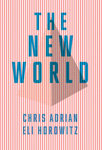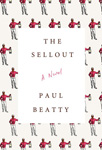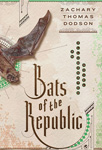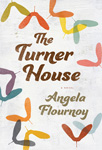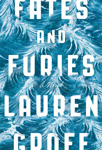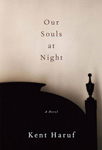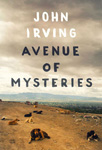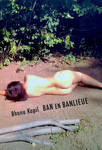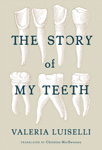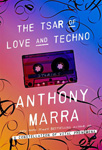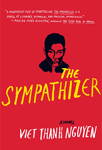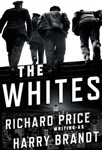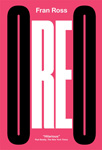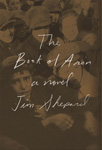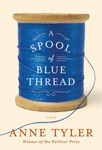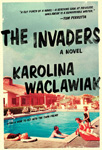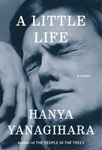by Chris Adrian and Eli Horowitz
Buy it at Powell’s »Liz Lopatto: Karolina Waclawiak’s The Invaders is a novel of suburban discontent, populated by the kind of exclusive Connecticut housewives who have rules about what colors are appropriate to wear to the country club. (Citrus colors are gauche in this set.) The narrative alternates between trophy wife Cheryl—who’s aware that her lease on the lifestyle is expiring, as she is now in her forties—and Teddy, her stepson. The book is meticulously constructed; several guns are placed on the mantle in the opening pages. By the end, all have fired.
“When Jeffrey’s first wife told me he had a voracious appetite for women, I assumed she was just trying to be vindictive,” the book begins, with Cheryl driving her narration directly into Cheever country. Teddy, on the other hand, seems to be a character Bret Easton Ellis considered for Less Than Zero but cut because he’s too boring.
One morning, while walking alone, Cheryl encounters a boardwalk masturbator; when she feels threatened by him, she hurls a rock against his skull. She discovers it was “Fran Cronin’s teenage son, Steven. Lori’s bad house sitter Steven. Nice legs Steven … His penis was hanging out of his pants. He was going to do something to me. Or maybe he was just peeing. Maybe this was a mistake.” She leaves him alive, and doesn’t summon help. When Steven is discovered, he keeps Cheryl’s secret. Of course, there are consequences.
The Invaders has already been optioned as a soap opera by ABC. Television would be a better medium for it. Waclawiak’s novel has been compared to David Lynch’s work; it’s meant to expose the rotting core of suburbia. But Lynch gives you the immaculate picket fence and rich red roses before he arrives at the unattached ear, covered in bugs. We barely see why Cheryl wants to belong. (On television, simply having fabulous costume and set design will be enough to convey the glamour of the lifestyle.) Her insistence on remaining in Little Neck Cove feels like inertia, which only increases as she begins popping painkillers to cope with her guilt. The ending is simultaneously over-determined in foreshadowing and emotionally unearned—in fact, the prose itself seems also to be under the dreamy influence of painkillers:
At home in front of the mirror, I thought about how close I was getting to fifty. A few more years I wouldn’t notice passing. What then? Eye the young ones with more venom? I didn’t want to feel this way anymore, I wanted to be the one to benefit from someone’s youth. My face had always been a bit pudgy and looking at myself now, I saw the kind of thin face I had dreamed about as a teenager. I didn’t think I could possibly feel worse than my fourteen-year-old self, but here I was.
I would have preferred to see her express this through action—sizing up a young wife, or someone’s daughter as competition at the country club, or talking to an older woman and seeing her own future. The mirror, besides being cliché, is static, and Cheryl is most interesting when she has company. Mostly, she’s just telling you how she feels, rather than making you feel it, too.
Meanwhile, in Paul Beatty’s The Sellout, the fury practically leaps off the page from the first sentence: “This may be hard to believe, coming from a black man, but I’ve never stolen anything.” The protagonist—last name Me, first name not given; nicknamed “Bonbon” by his beloved (a bus driver named Marpessa)—is an urban farmer, living in what was once a town named Dickens on the outskirts of LA. We meet Bonbon smoking weed on the steps of the US Supreme Court; he is accused of owning a slave. How did he get there?
When Dickens was wiped off the map, the town celebrity, Hominy Jenkins, is thrown into crisis and attempts suicide. When Bonbon rescues Jenkins, he declares Bonbon to be his master, and refers to himself as a slave; this fits with Jenkins’s history of taking racist pratfalls as a back-up member of The Little Rascals. (The local intellectuals consider Hominy a “mark of shame on the African-American legacy, something to be eradicated, stricken from the racial record, like the hambone, Amos ’n’ Andy, Dave Chappelle’s meltdown, and people who say ‘Valentime’s Day.’”)
For Hominy’s birthday, Bonbon puts up a sign on Marpessa’s bus that says “Priority Seating for Seniors, Disabled, and Whites.” The passengers greet it not with disbelief “that the city had the nerve to reinstitute public segregation, but that it had taken so long to do so.” Marpessa forgets to take the signs down—and then notices that her passengers are nicer to each other. From there, the whole town becomes Bonbon’s segregation project.
Bonbon’s father was a sociologist; Bonbon was homeschooled, and his education involved re-enacting several infamous psychological studies. Though Bonbon apparently loathes his father, he turns all of Dickens into a sociological experiment. It’s tempting to ignore the plot and focus on Beatty’s prose, which is astonished and furious in equal measure. But that’s a mistake; Bonbon is repeating his father’s social experiments—the ones he hated—on an entire town. You could read it as a bizarre mourning ritual, as his father is shot dead by police early in the book; but it also functions to bolster a repeated theme, that there’s no escaping the past, or as Beatty writes:
Motherfuckers don’t believe I buried him [Bonbon’s father] in the backyard. But I did … Nothing ever grows over that square of land. Not before he died or since. There’s no headstone … Dad used to like apples. He ate them all the time … I drove home with a ready-for-ground Velvet Scrumptious tree, the crack of the apple world, insane yield, perfect snap, chock-full of vitamin C. I planted the tree about two feet from where I buried Daddy. I thought it would be nice if he had some shade. Two days later it was dead. And the apples tasted like mentholated cigarettes, liver and onions, and cheap fucking rum.
At times there are more emotions packed into a single sentence of Beatty’s prose than we see in whole paragraphs of Waclawiak’s. Each book is a novel of place: the segregated lives of rich white suburbia and of urban poor people of color. The difference in style, however, is what’s truly remarkable. Like its characters, The Invaders feels emotionally deadened, a little overblown, and short on telling details; The Sellout, in contrast, is lean, quick-witted, and defiantly absurd. Though The Sellout doesn’t resolve its plot as cleanly as The Invaders, the ending still feels earned. More than that, the book is one of the funniest things I’ve read in years—almost every paragraph in The Sellout has a knockout one-liner, but all of them go in service of the plot. It’s a sublime aesthetic experience to see an author operate at such a high level. Beatty takes it.
Match Commentary
By Kevin Guilfoile & John Warner
John: Hooray! For once—and I honestly don’t remember another time this happened—my favorite won!
This is not to say that The Invaders is a bad book by any stretch. Its milieu is ripe but I agree 1,000 percent with Judge Lopatto that it should make a better TV show (pitched somewhere between Desperate Housewives and The Leftovers) than a novel. For me, the read was similar to the now-extinguished Jeb Bush candidacy: low-energy. The scenes and situations seemed promising, but I’d exit each section with a “well, that happened” shrug.
Dramatized and enhanced by performance and staging, The Invaders is going to be lot of fun.
In contrast, The Sellout has energy to spare. Each line does the work it needs to do. Look at that opening sentence! It’s a beautifully crafted novel.
Kevin: This assessment by Judge Lopatto, in addition to being smart and insightful and well-written, is a model of restraint. She doesn’t mention until the very end how funny The Sellout is. This is like a Yelp review of a nudist colony that that spends 1,000 words celebrating the generous pours at the juice bar and high quality of the volleyball competition before closing with, “Oh, and by the way everyone’s all-the-time buck naked!”
This book is hilarious, and it’s funny on every page. Truly comic novels rarely make it into the ToB and when they do they rarely go far. (Sam Lipsyte’s gut-buster Homeland was the exception). It is so hard to maintain a comic voice for 300 pages, but holy cats, Beatty had me laughing over and over and over again. And what elevates The Sellout even further is how uncomfortable that laughter often is. Of course, a book like this, if it’s any good, should make a middle-aged white man like myself uncomfortable, but I have to believe that an American reader of just about any race or background would be knocked a bit off their pins by the satire here.
(What’s my source for that, John? The Pew Research Center. “Motherfuckers from Harvard to Harlem respect the Pew Research Center,” as anyone who’s read this book knows.)
John, I am just barely old enough (and maybe you are, too) that I can remember when reruns of The Little Rascals aired frequently on local TV. This was pre-cable and there wasn’t much else for pre-schoolers to watch, so I probably saw almost every one of those shorts before I was eight. I wouldn’t suggest to anyone that they seek that show out—it was horrible. But the lengthy Wikipedia entry on the life of Allen “Farina” Hoskins, clearly the inspiration for Beatty’s Hominy, is a pretty good supplemental read.
John: When we were young, I don’t think we had service of the word “problematic,” but it’s the one that comes to mind when I think of the hours of my youth spent absorbing those Our Gang serials.
The Sellout makes us uncomfortable because rather than calling something “problematic,” it says it’s straight-up bullshit. The novel is framed by a (rather absurd) Supreme Court case, which I think represents the fact that the text is an indictment of, well, everything.
One’s comfort with or enjoyment of Beatty’s treatment may rest on our personal world view. I look around at a world ordered around the needs of middle-aged white guys created by middle-aged white guys and even to me, a middle-aged white guy, I see a lot of problematic things, by which I mean to say, shit’s fucked up.
A good satire, and The Sellout is a great one, forces you to confront those realities. It is uncomfortable at times, and underneath the laughter is the justifiable, simmering anger. Beatty is working very much in the tradition of great black standups like Moms Mabley, Dick Gregory, and Richard Pryor of selling the truth with a joke.
But don’t let the laughter fool you. This is a fierce, fierce book.
Kevin: The Sellout isn’t conventionally “topical,” but it feels like the right novel for these times. Not only is it a book I want everyone to read, I want everyone to read it right now.
On Monday we start the quarterfinals, as giant-killing Zachary Thomas Dodson’s Bats of the Republic takes on Viet Thanh Nguyen’s The Sympathizer, with magazine editor Kit Rachlis wearing the robes.
This is also the time when we start to look forward to the Zombie Round by revealing the current Zombie contenders. For those who are new to the Rooster, once the field is winnowed down to just two books—and we’re about to head into the championship match—a pair of novels that have previously been eliminated will be reborn to do battle against the presumptive finalists. These Zombies will be chosen based on their finish in a poll taken among ToB fans prior to the tournament.
Obviously, these results may change as more books are eliminated. But if the Zombie Round were held today, our flesh-rotting decomp-etitors would be (in alphabetical order) Lauren Groff’s Fates and Furies and Valeria Luiselli’s The Story of My Teeth.
Sadly, this means the end for Avenue of Mysteries, Oreo, Ban en Banlieue, The Whites, The New World, The Book of Aron, and The Invaders.

The official 2016 Tournament of Books T-Shirt by book designer Janet Hansen. Order yours!


